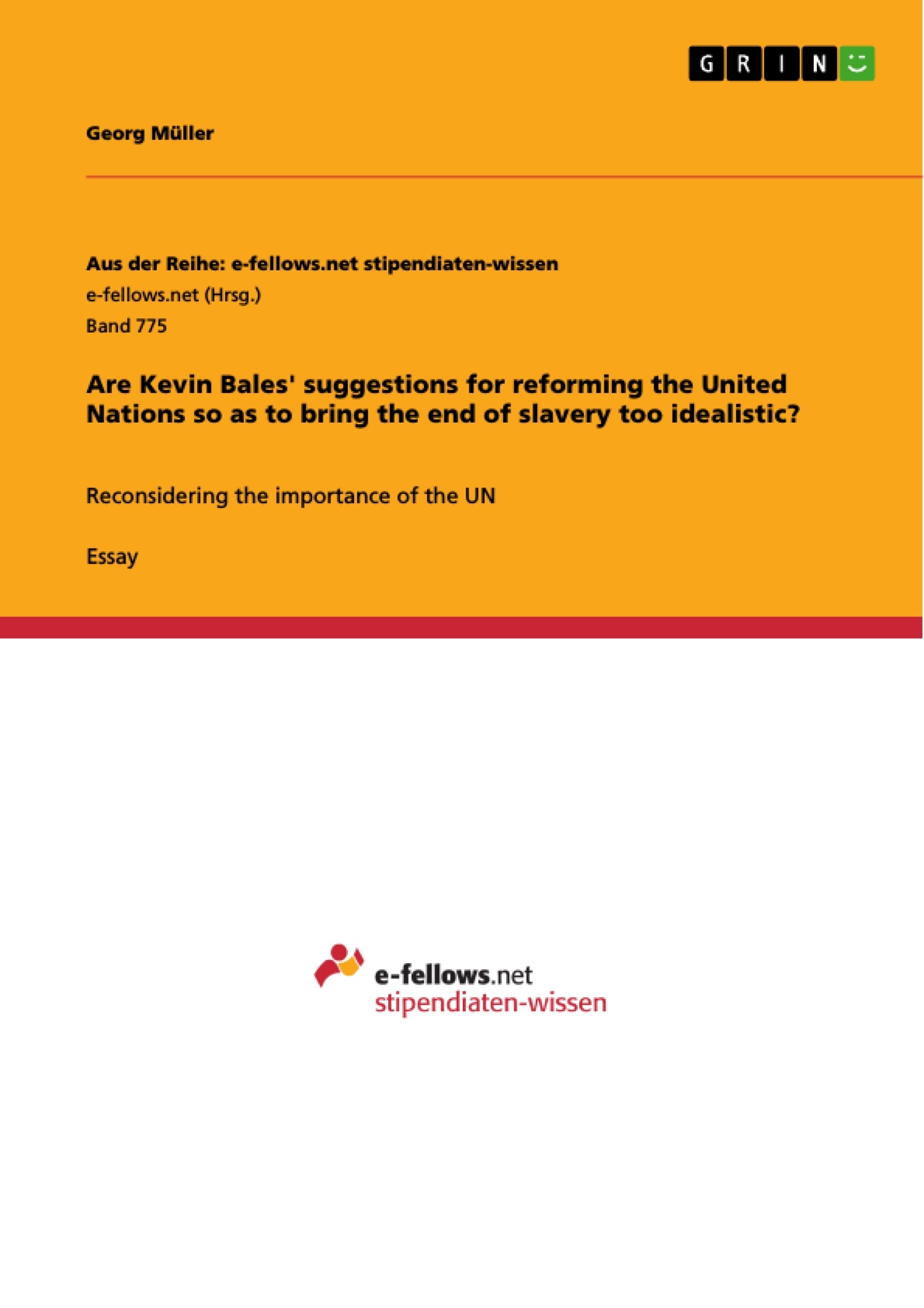Today slavery is not only officially illegal in all nations but furthermore every human
being has, in reversion, a non-derogable right not to be enslaved thus giving the
crime of slavery a jus cogens status. Nonetheless, together with other jus cogens
norms such as the prohibition of torture or genocide, slavery still prevails in the world
with unprecedented numbers of modern slaves. Kevin Bales claims, however, that
the UN together with other transnational organizations can potentially contribute to
ending slavery rather sooner than later – if they are reformed. This paper will focus
on his arguments for reforming the UN and its associated organizations so as to
achieve this goal. It will argue that while Bales makes a very good case for reforming
the UN his propositions seem sometimes only to have aspirational character and it
appears questionable whether they can ever be implemented. However, this is not to
say that his suggestions are not of tremendous importance, but rather, this essay
wants to argue that the importance of the UN should not be overstated. Generally
this essay will focus first on whether the reforms suggested by Bales are feasible and
second if they are to be implemented how effective they can be in eradicating
slavery. Regarding the first point this essay will outline different arguments regarding
the implementation of the reforms according to Slaughter’s and Mearsheimer’s line
of argumentation. In regard to the latter point this essay will focus first on the lack of
enforceability while acknowledging the informational power of the UN and second on
the underlying problems of slavery that stand to some extend in contrast to the UN’s
mission. Finally this paper will conclude that while it is not impossible to implement
the proposed changes in the UN there are considerable challenges to be overcome
and furthermore the effect these changes might have on the process of abolishing
slavery might be rather small. [...]
Inhaltsverzeichnis (Table of Contents)
- Introduction
- The Feasability of Reforming the UN
- The Role of States
- The Role of Transnational Networks
- The Effectiveness of UN Reform in Combating Slavery
- The UN's Lack of Enforcement Power
- The Informal Power of the UN
- The Underlying Causes of Slavery
- Conclusion
Zielsetzung und Themenschwerpunkte (Objectives and Key Themes)
This paper examines the feasibility and effectiveness of reforming the United Nations (UN) to combat slavery, drawing on Kevin Bales' five-point plan for reform. The paper investigates if Bales' proposals are practical and whether they can effectively eradicate slavery. It explores competing arguments about the UN's role and power in international affairs, considering the influence of states and transnational networks. Key themes include:- The role of the UN in combating slavery
- The feasibility of reforming the UN
- The effectiveness of UN reform in eradicating slavery
- The influence of states and transnational networks in international affairs
- The importance of addressing the underlying causes of slavery
Zusammenfassung der Kapitel (Chapter Summaries)
The first chapter introduces the problem of modern slavery and Bales' five-point plan for reforming the UN to combat it. It raises the question of whether Bales' proposals are feasible and effective. The second chapter delves into the feasibility of implementing Bales' reforms, examining the role of states and transnational networks in international affairs. It considers whether states would be willing to cooperate in a reform effort, highlighting the complexities of competing interests and the limited economic incentives for action. The third chapter analyzes the effectiveness of the proposed reforms in eradicating slavery. It acknowledges the UN's informational power but also points to its limited enforcement capabilities. The chapter concludes by arguing that addressing the underlying causes of slavery, such as poverty and lack of education, might be more effective than focusing solely on anti-slavery measures.Schlüsselwörter (Keywords)
This paper focuses on the themes of modern slavery, UN reform, transnational networks, state interests, enforcement power, informational power, underlying causes of slavery, and international cooperation.Frequently Asked Questions
What is Kevin Bales' five-point plan for the UN?
It is a proposal to reform the United Nations and associated organizations to effectively combat and end modern slavery.
Is modern slavery illegal worldwide?
Yes, slavery is officially illegal in all nations and has a "jus cogens" status, meaning it is a non-derogable right not to be enslaved.
Why is reforming the UN to end slavery considered "idealistic"?
The essay argues that while Bales makes a good case, the proposals are often aspirational and face challenges like lack of enforcement power and competing state interests.
What are the underlying causes of modern slavery?
The paper points to fundamental issues like poverty and lack of education, which may be more critical to address than institutional reforms alone.
Does the UN have the power to stop slavery?
The UN possesses significant "informational power" but lacks direct enforcement power, making it difficult to eradicate slavery without the full cooperation of sovereign states.
- Arbeit zitieren
- Georg Müller (Autor:in), 2013, Are Kevin Bales' suggestions for reforming the United Nations so as to bring the end of slavery too idealistic?, München, GRIN Verlag, https://www.grin.com/document/231593



